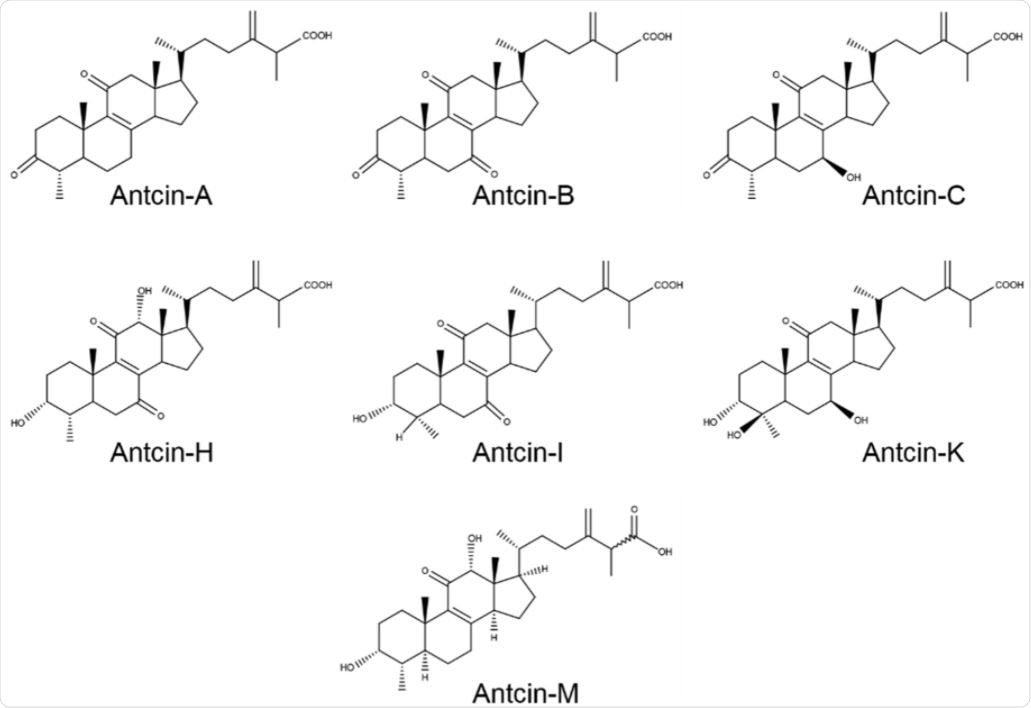Certain steroid-like compounds from Taiwan's endemic medicinal mushrooms (known as antcins) may inhibit a host cell receptor for severe acute respiratory syndrome coronavirus 2 (SARS-CoV-2) and, thus, prevent viral infection and subsequent development of the coronavirus disease (COVID-19), reports a new study published in the MDPI's journal Plants.
Notwithstanding the worldwide distribution of vaccines aimed to halt the ongoing COVID-19 pandemic, cases and deaths are still on the rise due to the unavailability of effective drugs which would aid in preventing or slowing down the infection with SARS-CoV-2. Thus, a double whammy effect of a vaccine and a drug is probably what we need to solve this pandemic.
Hence, the quest for the best candidate drug continues. One of the salient targets of anti-COVID-19 compounds is angiotensin-converting enzyme 2 (ACE2), which is actually a host cell surface receptor exploited by SARS-CoV-2 to begin the whole infectious process.
We already know the important role of medicinal herbs in the prevention and treatment of certain diseases, while several phytocompounds were shown to have ACE2 inhibitory activity. Consequently, they are investigated in depth by using different computational, preclinical and clinical models.
Antrodia cinnamomea and Antrodia salmonea are two endemic fungi found in Taiwan with many pharmacological activities. As a result, their potential use against SARS-CoV-2 has been recently explored by a group of authors from National Chung Hsing University in Taiwan.
Moving from in silico studies to cell lines
In short, these authors have explored the inhibitory effects of various antcins against ACE2 receptors. Antcins are steroid-like compounds produced by the aforementioned endemic fungi, and this study aimed to assess properties of 99% pure antcin-A, antcin-B, antcin-C, antcin-H, antcin-I and antcin-M.

Chemical structure of antcins.
For that purpose, they have used human colorectal adenocarcinoma (HT-29) cell line, while cellular ACE2 activity has been measured with commercially available human ACE2 enzyme-linked immunosorbent assay (ELISA). Cytotoxicity of various antcins on HT-29 cells was also determined prior to investigating inhibitory effects.
Based on the results of a specific colorimetric assay, the researchers have selected optimal non-cytotoxic concentrations of antcins to use in their experiments. Due to its cytotoxicity, antcin-K was actually dropped from their list for further investigations.
Effectively reducing levels of ACE2
The researchers have found that all the treated antcins – with the exception of antcin-M – show significant inhibition on ACE2 activity. More specifically, there was a robust reduction of human ACE2 levels in HT-29 cells when antcin-A, antcin-B, antcin-C and antcin-I were used, and a moderate reduction was seen in antcin-H treated cells.
Moreover, all the tested antcins failed to inhibit the messenger RNA (mRNA) expression of either ACE2 or TMPRSS2 (the latter being an endothelial cell surface protein implicated in the viral entry and spread of coronaviruses) in HT-29 cells, which implies that antcin-induced reduction in ACE2 was not a result of down-regulation at the mRNA level.
This type of protein expression reduction of ACE2 and TMPRSS2 in host cells can indeed represent a viable strategy for the prophylaxis and treatment of SARS-CoV-2 infection, as it can successfully halt one of the most crucial events in human-to-human disease transmission.
Still a long way from hypothesis to bedside
Recently, many natural products have been evaluated as potential preventive or treatment solutions against COVID-19, but most of these studies used in silico models, which means computer modeling and simulations. This study took one step further and utilized reliable cell models.
"The hypothesis that antcin-induced reduction in ACE2 was most likely related to ACE2 protein stability or degradation by proteasome pathway rather than transcriptional inhibition is reasonable", say study authors in this paper published in the journal Plants.
"We believe that further pharmacological, toxicological, and bioavailability studies may support our hypothesis that antcins can be a potential ACE2 inhibitor for prophylaxis of COVID-19", they add.
All these findings should be viewed strictly as preliminary; thus, at the moment, it is impossible to claim that antcins will indeed one day be valuable prophylactic or therapeutic agents for clinical usage. However, the results seem promising and these steroid-like compounds may well be an important addition in our fight against COVID-19.